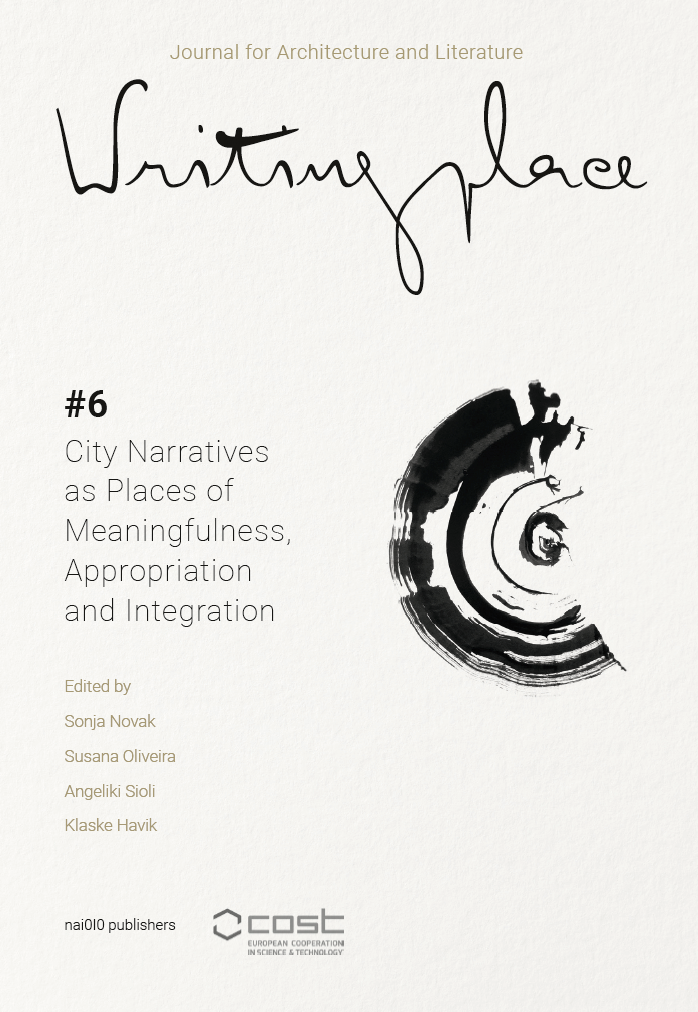Appropriation and Gendered Spaces
A Discussion on Elena Ferrante’s Neapolitan Novels
DOI:
https://doi.org/10.7480/writingplace.6.6355Abstract
Elena Ferrante’s series Neapolitan Novels (2011-2014) has been characterized as a female bildungsroman that begins in 1950s Naples. It follows the lives of two protagonists, Lenù (Elena) Greco and Lila (Raffaella) Cerullo, from childhood to old age as they struggle to figure out what they want/need to be/become by challenging the dominant gender roles and power relations embedded in the society. Within the framework of Gillian Rose and Doreen Massey’s theoretical conceptualizations regarding space, this article aims to discuss appropriation of urban space from a gendered perspective as presented through the Neapolitan Novels and in Ferrante’s Naples. Ferrante’s Neapolitan novels not only portray the personal transformation of the main characters Lenú and Lila, but also, their practices of urban appropriation, their relationship with the neighbourhood they live in along with the transformation of Naples as a socially constructed space itself.
References
Kathryne Beebe, Angela Davis and Kathryn Gleadle, ‘Introduction: Space, Place and Gendered Identities: Feminist History and the Spatial Turn’, Women’s History Review 21/4 (2012), 523-532.
Dolores Hayden, The Power of Place: Urban Landscapes as Public History (Boston, 1997), 15.
Yi-Fu Tuan, Space and Place: The Perspective of Experience (Minnesota, 1977);
Edward Relph, Place and Placelessness (London, 1976); Tim Creswell, Place: A Short Introduction (Malden, 2004).
Tuan, Space and Place, op. cit. (note 3), 6.
Michel Foucault, The Foucault Reader (New York, 1984), 252.
Linda McDowell, ‘Towards an Understanding of the Gender Division of Urban Space’, Environment and Planning D: Society and Space 1/1 (1983), 59-72.
Leslie Kern, Feminist City: Claiming Space in a Man-made World (London, 2020), 47.
Liz Bondi and Joyce Davidson, ‘Situating Gender’, in: Lise Nelson and Joni Seager (eds.), A Companion to Feminist Geography (New Jersey, 2005), 15-31.
Doreen Massey, ‘Politics and Space/Time’, New Left Review 196 (1992), 65.
Koskela Hille, ‘“Gendered Exclusions”: Women’s Fear of Violence and Changing Relations to Space’, Geografiska Annaler: Series B, Human Geography 81/2 (1999), 111-124
Gill Valentine, ‘The Geography of Women’s Fear’, Area 21/4 (1989), 385-390
Gerda R. Wekerle, ‘Women’s Rights to the City: Gendered Spaces of a Pluralistic Citizenship’, in: Engin F. Isin (ed.), Democracy, Citizenship, and the Global City (London, 2000), 203-217.
Gillian Rose, Feminism & Geography: The Limits of Geographical Knowledge (Minnesota, 1993), 159.
Henri Lefebvre, Writings on Cities (Cambridge, 1996), 174.
Henri Lefebvre, The Urban Revolution (Minnesota, 2003), 1.
Mark Purcell, ‘Possible Worlds: Henri Lefebvre and the Right to the City’, Journal of Urban Affairs 36/1 (2014), 141-154.
Perla Korosec-Serfaty, ‘The Home from Attic to Cellar’, Journal of Environmental Psychology 4/4 (1985), 303-321.
Frank O. Ostermann and Sabine Timpf, ‘Use and Appropriation of Space in Urban Public Parks: GIS Methods in Social Geography’, Geographica Helvetica 64/1 (2009), 30-36.
Harold M. Proshansky, ‘The Appropriation and Misappropriation of Space’, in: Appropriation of Space: Proceedings of the Strasbourg Conference (Louvain-la-Neuve, 1976), 31-45.
Roberta M. Feldman and Susan Stall, ‘The Politics of Space Appropriation’, in: Irwin Altman and Arza Churchman (eds.), Women and the Environment (Boston, 1994), 167-199.
Kern, Feminist City, op. cit. (note 7), 159.
Elena Ferrante, My Brilliant Friend (London, 2012), 192.
Rose, Feminism & Geography, op. cit. (note 12), 140.
Elena Ferrante, Those Who Leave and Those Who Stay (London, 2014), 358.
Elena Ferrante, The Story of the Lost Child (London, 2020), 116.
Sara Santos Cruz, ‘Appropriation as Transformative, Manipulative and Affective’, keynote speech at online mini conference ‘Meaningfulness, Appropriation and Integration of/in City Narratives’ by COST Action 18126 Working Group 2, 17 November 2020.
Ferrante, The Story of the Lost Child, op. cit. (note 30), 477
Downloads
Published
How to Cite
Issue
Section
License
Copyright (c) 2022 Sernaz Arslan

This work is licensed under a Creative Commons Attribution 4.0 International License.



